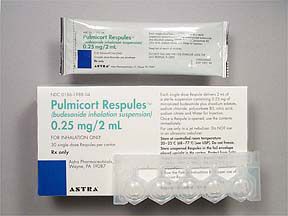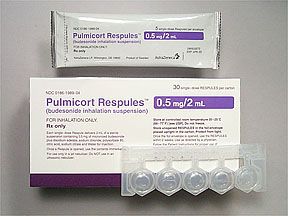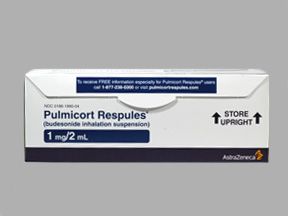If you have asthma, your doctor might suggest Pulmicort (budesonide) as a treatment option.
Pulmicort is a prescription medication that’s used to treat asthma in adults and in children. Regular use of Pulmicort can help prevent or reduce your asthma symptoms.
It’s important to note that Pulmicort isn’t a rescue inhaler, so it doesn’t work to treat an asthma attack. (An asthma attack is a sudden episode of worsened asthma symptoms, such as wheezing and shortness of breath.)
This article describes the dosages of Pulmicort, including its forms, strengths, and how to use the drug. To learn more about Pulmicort, see this in-depth article.
Note: This article covers Pulmicort’s typical dosages, which are provided by the drug’s manufacturer. But when using Pulmicort, always take the dosage that your doctor prescribes.
This section covers common questions about the dosage of Pulmicort.
What are the forms of Pulmicort?
Pulmicort comes in two forms: Pulmicort Flexhaler and Pulmicort Respules.
- Pulmicort Flexhaler is a dry powder that you inhale (breathe into your lungs) using a handheld device.
- Pulmicort Respules are small plastic containers that hold a liquid solution. You use this form with a device called a nebulizer. This is a machine that changes liquid medication into an inhalable mist (a mist you can breathe in).
What strengths does Pulmicort come in?
Pulmicort Flexhaler comes in two strengths: 90 micrograms (mcg) per puff and 180 mcg per puff.
Pulmicort Respules come in three strengths: 0.25 milligrams (mg) per 2 milliliters (mL), 0.5 mg/2 mL, and 1 mg/2 mL.
What are the typical dosages of Pulmicort?
Your doctor will likely start you on a low dosage. Then they’ll adjust your dosage over time to reach the right amount for you. Your doctor will ultimately prescribe the smallest dosage that provides the desired effect.
Your dosage of Pulmicort may depend on how severe your asthma symptoms are. Your doctor might also factor in how well your symptoms are managed by other drugs.
Your doctor may provide instructions to adjust your dosage based on your asthma symptoms. These symptoms can vary from mild to severe.
The information below describes dosages that are commonly used or recommended. But be sure to take the dosage your doctor prescribes for you. Your doctor will determine the best dosage to fit your needs.
Dosage of Pulmicort Flexhaler
If your doctor prescribes Pulmicort Flexhaler, the number of puffs you’ll take depends on which strength you’re using.
For example, say your dosage of Pulmicort Flexhaler is 180 mcg twice daily. If you’re using the 90-mcg strength, you’ll need to take two puffs twice daily. With the 180-mcg strength, you’ll only need to take one puff twice daily.
If you have any questions about your dosage of Pulmicort Flexhaler, check with your doctor or pharmacist.
Dosage for adults with asthma
The usual dosage of Pulmicort Flexhaler for adults is 180 mcg to 360 mcg inhaled twice daily. The maximum dosage for adults is 720 mcg twice daily.
Dosage for children with asthma
Children ages 6 to 17 years can use Pulmicort Flexhaler to treat asthma. The usual dosage of Pulmicort Flexhaler for this age group is 180 mcg to 360 mcg inhaled twice daily. The maximum dosage for children is 360 mcg twice daily.
Dosage of Pulmicort Respules for children
Pulmicort Respules are used only in children ages 12 months to 8 years. Pulmicort Flexhaler isn’t approved for use in toddlers or very young children (younger than 6 years). And neither form of Pulmicort is approved for use in infants (children younger than 12 months).
The usual dosage of Pulmicort Respules for children varies. It can range from 0.25 mg to 0.5 mg once or twice daily. The maximum dosage is up to 1 mg once daily.
Is Pulmicort used long term?
Yes, Pulmicort is typically used as a long-term treatment. If you and your doctor determine that Pulmicort is safe and effective for you, it’s likely that you’ll use it long term.
What’s the dosage of Pulmicort for children?
To learn about children’s dosage for the two forms of Pulmicort, see “Dosage for Pulmicort Flexhaler” and “Dosage for Pulmicort Respules for children” above.
Dosage adjustments
Your doctor may adjust your Pulmicort dosage over time. This usually depends on how well the drug is working for you.
If your child is using Pulmicort Respules, their starting dosage may depend on the type of asthma medications they used in the past. Dosage adjustments will depend on how well their symptoms reduce with different treatment types.
If you have questions about adjusting your or your child’s dosage of Pulmicort, talk with your doctor.
Below are answers to some common questions about Pulmicort.
Is Pulmicort used for COPD? If so, what’s the dosage?
Pulmicort may be used off-label for chronic obstructive pulmonary disease (COPD). With off-label use, a drug is used to treat a condition that it isn’t approved to treat.
A
If you have COPD, talk with your doctor about the best treatment option to fit your needs.
Will my Pulmicort dosage change if I use the drug while pregnant?
Pulmicort isn’t known to cause harmful effects during pregnancy. But if you’re pregnant, your doctor may recommend the smallest dosage that manages your asthma symptoms during this time.
You shouldn’t stop the medication without consulting your doctor. This is because stopping Pulmicort can worsen asthma. Severe asthma symptoms and asthma attacks can increase the risk for harmful effects for a developing fetus.
If you use Pulmicort and become pregnant, talk with your doctor.
The dosage of Pulmicort you’re prescribed may depend on several factors. These include:
- the severity of your asthma symptoms
- your age
- the form of Pulmicort you’re using
- other medications you’ve used and how well they’ve worked for you
You should use Pulmicort according to your healthcare professional’s instructions.
After each use of Pulmicort, rinse your mouth with water and spit it out. This helps to prevent a fungal infection of the mouth known as oral thrush. Oral thrush is a common side effect of certain inhaled medications.
For more information about Pulmicort’s side effects, see this article.
How to use Pulmicort Flexhaler
Pulmicort Flexhaler comes as a dry, tasteless powder that you inhale through a handheld plastic device. You breathe each puff into your lungs through your mouth.
You can view step-by-step instructions or watch a detailed video on how to use Pulmicort Flexhaler on the manufacturer’s website.
How to use Pulmicort Respules
Pulmicort Respules come in small plastic containers that hold a liquid solution. You use a jet nebulizer* to turn the liquid into a mist that your child inhales.
You can get detailed instructions or watch a video demonstration on how to use Pulmicort Respules on the manufacturer’s website.
* Pulmicort Respules aren’t meant to be used with ultrasonic nebulizers. Before your child uses Pulmicort Respules, consult their doctor or pharmacist to ensure you have the right type of nebulizer.
If you miss a dose of Pulmicort, take your dose as soon as you remember. But if it’s almost time for your next dose, skip the missed dose. It’s best not to take more than your prescribed dose of Pulmicort at one time.
If you need help remembering to take your dose of Pulmicort, try using a medication reminder. This can include setting an alarm, downloading a reminder app, or setting a timer on your phone. A kitchen timer can work, too.
Don’t use more Pulmicort than your doctor prescribes.
Taking more than the recommended dose of Pulmicort doesn’t usually cause short-term harm. But if you take extra doses of Pulmicort over a long time period, serious side effects may develop.
Symptoms of overdose
Symptoms caused by long-term use of Pulmicort in doses that are higher than recommended may include:
- weight gain
- body changes, such as the face becoming rounder or a hump developing on the upper back
- bruising easily
- slow wound healing
- acne
What to do in case you use too much Pulmicort
Call your doctor right away if you think you’ve used too much Pulmicort or if you accidentally swallow Pulmicort Respules. You can also call 800-222-1222 to reach the American Association of Poison Control Centers or use their online resource. But if you have severe symptoms, call 911 (or your local emergency number) immediately or go to the nearest emergency room.
If your doctor recommends that you stop using Pulmicort, they might have you gradually lower your dosage. Or they may recommend that you use a similar asthma medication instead of Pulmicort.
This is because suddenly stopping Pulmicort could increase your risk for adrenal insufficiency. This means your adrenal glands aren’t producing enough of certain hormones that help your body respond to stress.
Your risk for adrenal insufficiency is increased if you’ve been taking high doses of Pulmicort for a long time. Symptoms of adrenal insufficiency may include:
- feeling weak or tired
- nausea or vomiting
- low blood pressure
Stopping Pulmicort without a new treatment plan may also cause your asthma symptoms to return or get worse.
Don’t stop using Pulmicort without first talking with your doctor.
This article describes the typical dosages provided by Pulmicort’s manufacturer. If your doctor recommends Pulmicort for you, they will prescribe the dosage that suits your needs.
Remember, you shouldn’t change your dosage of Pulmicort without your doctor’s approval. Only use Pulmicort exactly as prescribed. Talk with your doctor if you have questions or concerns about your current dosage.
Here are some questions you may want to ask your doctor:
- Would a higher dosage raise my risk for side effects from Pulmicort?
- Does my child’s dosage of Pulmicort need to change if they’re prescribed other drugs?
- How long should I give Pulmicort a chance to start working before we discuss changing my dosage?
- As long as I don’t use more than the maximum recommended dosage, can I adjust my dosage based on how bad my asthma symptoms are?
For tips on managing your asthma, sign up for Healthline’s Allergies & Asthma newsletter.
Q:
My doctor told me to take an extra puff of my albuterol inhaler shortly before exercising. Will it help if I also take an extra dose of Pulmicort before exercising?
Anonymous patientA:
No, taking an extra dose of Pulmicort won’t help you before exercising. In fact, it may harm you because you’ll be taking more medication than prescribed.
Albuterol inhalers are used as rescue inhalers. This means they treat acute (sudden) bronchospasm. With bronchospasm, your airways narrow, making it hard to breath. Pulmicort Flexhaler and Pulmicort Respules aren’t approved to treat acute bronchospasm because they don’t work to quickly open airways.
Dena Westphalen, PharmDAnswers represent the opinions of our medical experts. All content is strictly informational and should not be considered medical advice.Disclaimer: Healthline has made every effort to make certain that all information is factually correct, comprehensive, and up to date. However, this article should not be used as a substitute for the knowledge and expertise of a licensed healthcare professional. You should always consult your doctor or other healthcare professional before taking any medication. The drug information contained herein is subject to change and is not intended to cover all possible uses, directions, precautions, warnings, drug interactions, allergic reactions, or adverse effects. The absence of warnings or other information for a given drug does not indicate that the drug or drug combination is safe, effective, or appropriate for all patients or all specific uses.



